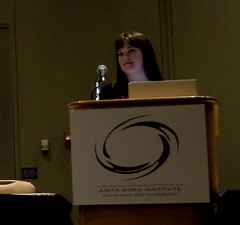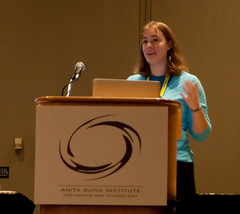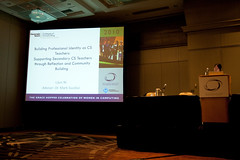I'm re-reading Richard Hamming's talk on You and Your Research because I felt like I needed the kick in the pants to do great work this month after some very busy months of doing necessary but not necessarily great things.
In this reading, I was struck by this anecdote:
On a surface level, I've long believed this is true. I've been long primed in the art of social hacking, first by my father and more recently as a security researcher/hacker. Anyone can watch the subtle variations on how I dress on teaching days or days when I'm going to the bank and you'll note that I pay attention to fitting in to the environment and manipulating the way in which I'm perceived. But as a child of the Internet, more or less, my experimentation hasn't limited to physical presentation. Especially as a teenager, I spent a lot of time grossly mis-representing my age and gender as well and watching how that changed my interactions with folk.
But what gets me this time is the end of that quote: "[If you don't appear to conform,] you pay a small steady price throughout the whole of your professional career. And this, over a whole lifetime, adds up to an enormous amount of needless trouble." Sometimes it's important to change the system, but sometimes you just want to get stuff done.
I can dress the part, but I don't generally change my gender presentation in real life. Is my female-ness adding up to an enormous amount of needless trouble over my lifetime given that I work in a field where that's going to make me non-conforming? I suspect it is, although I'm fortunate enough that my gender presentation is often canceled out by my racial makeup (Asian girls are totally good at math, don'tcha know?) so I can console myself by saying maybe it's not as enormous as it might have been. But not every person who doesn't fit the norm for their field has that consolation prize. Are we all paying the price of being different?
It's easy to get a little saddened by this. All that time explaining that no, I really am a techie, has added up to a lot of time I'm not having amazing conversations and doing great work. But before you get too saddened about how your hard-to-hide features like race/age/gender are affecting your ability to Do Great Things, you should stop and listen to Duy Loan Le's excellent 2010 Grace Hopper Celebration Keynote. In it, she talks about what she does to fit in to environments where she felt that letting go of her ego made it possible for her to get more good work done. I think it's really worth a listen, especially if fitting in isn't just a choice of what suit to wear for you.
In this reading, I was struck by this anecdote:
John Tukey almost always dressed very casually. He would go into an important office and it would take a long time before the other fellow realized that this is a first-class man and he had better listen. For a long time John has had to overcome this kind of hostility. It's wasted effort! I didn't say you should conform; I said ``The appearance of conforming gets you a long way.'' If you chose to assert your ego in any number of ways, ``I am going to do it my way,'' you pay a small steady price throughout the whole of your professional career. And this, over a whole lifetime, adds up to an enormous amount of needless trouble.
On a surface level, I've long believed this is true. I've been long primed in the art of social hacking, first by my father and more recently as a security researcher/hacker. Anyone can watch the subtle variations on how I dress on teaching days or days when I'm going to the bank and you'll note that I pay attention to fitting in to the environment and manipulating the way in which I'm perceived. But as a child of the Internet, more or less, my experimentation hasn't limited to physical presentation. Especially as a teenager, I spent a lot of time grossly mis-representing my age and gender as well and watching how that changed my interactions with folk.
But what gets me this time is the end of that quote: "[If you don't appear to conform,] you pay a small steady price throughout the whole of your professional career. And this, over a whole lifetime, adds up to an enormous amount of needless trouble." Sometimes it's important to change the system, but sometimes you just want to get stuff done.
I can dress the part, but I don't generally change my gender presentation in real life. Is my female-ness adding up to an enormous amount of needless trouble over my lifetime given that I work in a field where that's going to make me non-conforming? I suspect it is, although I'm fortunate enough that my gender presentation is often canceled out by my racial makeup (Asian girls are totally good at math, don'tcha know?) so I can console myself by saying maybe it's not as enormous as it might have been. But not every person who doesn't fit the norm for their field has that consolation prize. Are we all paying the price of being different?
It's easy to get a little saddened by this. All that time explaining that no, I really am a techie, has added up to a lot of time I'm not having amazing conversations and doing great work. But before you get too saddened about how your hard-to-hide features like race/age/gender are affecting your ability to Do Great Things, you should stop and listen to Duy Loan Le's excellent 2010 Grace Hopper Celebration Keynote. In it, she talks about what she does to fit in to environments where she felt that letting go of her ego made it possible for her to get more good work done. I think it's really worth a listen, especially if fitting in isn't just a choice of what suit to wear for you.








